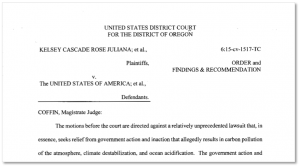by Michael Gerrard, Faculty Director
 Yesterday Magistrate Judge Thomas Coffin of the U.S. District Court of Oregon recommended denial of motions to dismiss a suit brought by a group of young people who alleged that excessive carbon emissions are threatening their future. The plaintiffs also include Dr. James Hansen, who is named as a guardian for plaintiff “future generations.” The case is Kelsey Cascade Rose Juliana v. United States. It is one of the numerous suits organized by Our Children’s Trust.
Yesterday Magistrate Judge Thomas Coffin of the U.S. District Court of Oregon recommended denial of motions to dismiss a suit brought by a group of young people who alleged that excessive carbon emissions are threatening their future. The plaintiffs also include Dr. James Hansen, who is named as a guardian for plaintiff “future generations.” The case is Kelsey Cascade Rose Juliana v. United States. It is one of the numerous suits organized by Our Children’s Trust.
The Magistrate Judge emphasized that, on a motion to dismiss, he was accepting all the complaint’s allegations as true. In view of that, among the notable aspects of his Findings and Recommendation, linked here:
- “Given the allegations of direct or threatened harm, albeit shared by most of the population or future population, the court should be loath to decline standing to persons suffering an alleged harm of a constitutional magnitude,” citing US v. SCRAP.
- “[P]laintiffs differentiate the impacts [of climate change] by alleging greater harm to youth and future generations… Plaintiffs give this debate justiciability by asserting harms that befall or will befall them personally and to a greater extent than older segments of society… [T]he intractability of the debates before Congress and state legislatures and the alleged valuing of short term economic interest despite the cost to human life, necessitates a need for the courts to evaluate the constitutional parameters of the action or inaction taken by the government. This is especially true when such harms have an alleged disparate impact on a discrete class of society.”
- With respect to redressability, “Assuming plaintiffs are correct that the United States is responsible for about 25% of the global CO2 emissions, the court cannot say, without the record being developed, that it is speculation to posit that a court order to undertake regulation of greenhouse gas emissions to protect the public health will not effectively redress the alleged resulting harm.” Here the Magistrate Judge cited the Hague trial court decision in Urgenda Foundation v. State of Netherlands.
- Rejecting the political question defense, “The complaint does raise issues of whether government action/inaction violates the Constitution and these issues are committed to the courts rather than either of the political branches.”
- A substantive due process claim has been adequately pled. “Plaintiffs allege that the defendants’ action in this case has created a life-threatening situation and that defendants have willfully ignored long-standing and overwhelming evidence of that impending harm to the young and future generations.”
- “At this stage of the proceedings, the court cannot say that the public trust doctrine does not provide at least some substantive due process protections for some plaintiffs within the navigable water areas of Oregon. Accordingly, the court should not dismiss any claims under the public trust doctrine to that extent.”
The document from Magistrate Judge Coffin is in the form of Findings and Recommendation to the district judge. It gives the parties 14 days to file written objections, to be followed by 14 days for responses to the objections. Then the district court will issue its judgment or order, and only then can an appeal be taken to the Ninth Circuit.
If these recommendations are adopted by the district court and upheld on appeal, the case will have opened up a major new front on climate litigation. This is all worth following closely.


